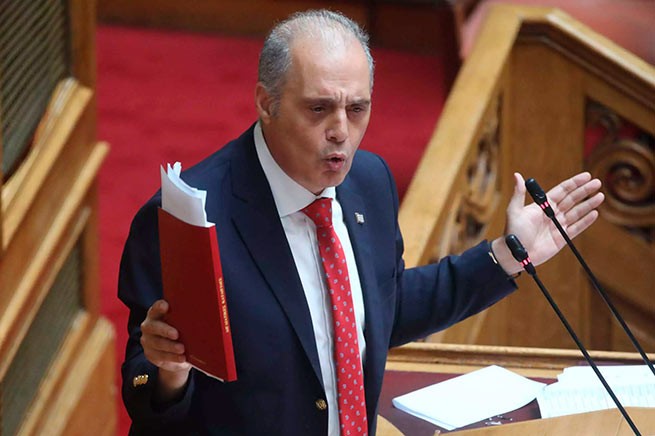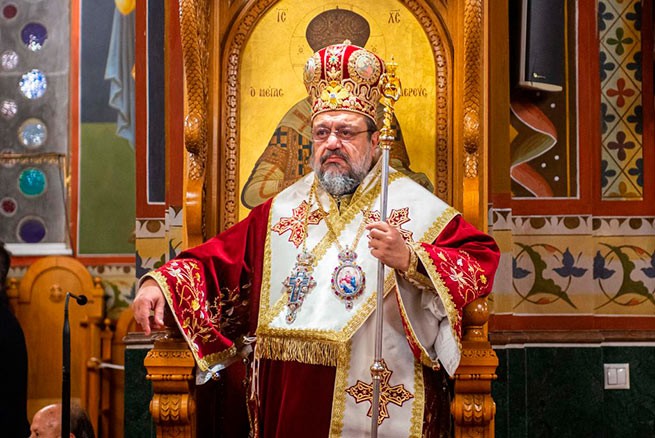The man suffered a cerebral hemorrhage on the eve of Easter, on Good Saturday, and was hospitalized in the intensive care unit of the University General Hospital of Heraklion, where he stubbornly fought for life for about a week. However, the “battle” was unequal.
In terms of organ donation, Greece ranks last in Europe.
The untimely death of a 49-year-old doctor, an employee of the Venizelio hospital in Heraklion, caused great grief among relatives and friends.
Surgeon Manolis Vasiloyannakis, 49, fought hard to stay alive. Being a “doctor to the marrow of the bones”, saving the lives of patients, he ordered that after his death he would donate his organs. His family signed documents to donate a heart, liver, kidney and cornea to patients in need. in.gr.
Thus, the doctor who saved lives all these years, with his death, gave life to several more people.
The funeral of Manolis Vasiloyannakis will take place on May 1 at 15:00 in Tylissos.
Help “Athenian news”
In terms of organ donation, Greece ranks last in Europe.
“We are the last in Europe in terms of organ donation: four donors per million. And this despite the fact that in other countries, such as Portugal, Italy and Spain, according to statistics, there are 28-30 donors,” said Andreas Karampinis, Chairman of the Board of the National Transplant Organization acting in the Standing Committee on Social Affairs
According to him, “we also have a huge loss of resources abroad. The current situation has improved in the last two years as we have a 35% increase in the number of donors and this is due to the private initiative of the Onsassis Foundation, which provided us with an amount of 100.000 euros. This has allowed us to integrate all intensive care units in Greece with the Onassis Hospital, where I am the director of the intensive care unit.”
The Chairman of ΕΟΜ also mentioned the funding of the Agency through ΕΣΠΑ, stating that: “The Ministry of Health and the Ministry of Public Administration have provided the National Transplant Organization with a National Strategic Plan covering a period of 2.5 years. The plan was studied and approved by experts, after which, 15 days ago, it was approved.
This ΕΣΠΑ program will legislate and create conditions for the functioning of all centers for tissue and cell transplantation, which in most countries are carried out on the basis of European Regulations.
The program will start in September this year. Will be released over the next few months new donor cardwhich will help the relatives of the deceased overcome obstacles in terms of donation.
“One of the reasons for the low number of operations is the negative attitude of the Greek society towards transplantation and organ donation. Few people in our country are ready to donate their organs after death to save other people,” said Mr. Karampinis.
How is this going on abroad?
In European countries, in the USA, Canada, Australia, transplantation saves tens of thousands of people every year. Many residents approve of transplantation and express a desire to become organ donors after death.
In the United States, it is customary to indicate your desire on your driver’s license. In Israel, Ireland, Poland there is donor card – a small card that can be inserted into wallet. In Belgium, there is a presumption of consent: if a person has not signed a refusal to organ donation during his lifetime, his organs can be transplanted to other people. This method of expression of will operates in many other European countries.
In the European Union, there are about 50,000 people on the waiting list for transplantation, every day 12 Europeans die without waiting for the operation.
In the US, about 120 thousand people need transplantation, every day 21 US residents die without waiting for a transplant.
Importance of Organ Transplant
Organ transplantation saves many lives. In this operation, a healthy organ of one person (donor) is transplanted into another person (recipient), in whom this organ does not work.
As a rule, the donor is a deceased person who has been diagnosed with brain death, but in some cases, for example, in a kidney transplant, a living volunteer can also be a donor. This is usually one of the next of kin of the recipient.
Only the support of the entire society can help those who need organ transplants survive. Therefore, people who, during their lifetime, agreed to donate their organs for transplantation after death are so important.
The attitude of the church towards donation
When the first transplants were carried out, the churches raised serious moral and ethical objections. But today they have revised their positions. The Evangelical Church generally welcomes posthumous donation. Pope Benedict XVI calls it “an act of love for one’s neighbour”. Prior to his election to the throne, he himself had a donor certificate.
The Pavoslav Church consolidated its position in the Fundamentals of the Social Concept: “Posthumous donation of organs and tissues can become a manifestation of love that extends beyond death. This kind of donation or bequest cannot be considered a human obligation. moral acceptability of explantation. If the will of a potential donor is unknown to doctors, they must find out the will of a dying or deceased person, contacting his relatives if necessary. ”
“We are the last in Europe in terms of organ donation: four donors per million. And this despite the fact that in other countries, such as Portugal, Italy and Spain, according to statistics, there are 28-30 donors,” said Andreas Karampinis, Chairman of the Board of the National Transplant Organization acting in the Standing Committee on Social Affairs
According to him, “we also have a huge loss of resources abroad. The current situation has improved in the last two years as we have a 35% increase in the number of donors and this is due to the private initiative of the Onsassis Foundation, which provided us with an amount of 100.000 euros. This has allowed us to integrate all intensive care units in Greece with the Onassis Hospital, where I am the director of the intensive care unit.”
The Chairman of ΕΟΜ also mentioned the funding of the Agency through ΕΣΠΑ, stating that: “The Ministry of Health and the Ministry of Public Administration have provided the National Transplant Organization with a National Strategic Plan covering a period of 2.5 years. The plan was studied and approved by experts, after which, 15 days ago, it was approved.
This ΕΣΠΑ program will legislate and create conditions for the functioning of all centers for tissue and cell transplantation, which in most countries are carried out on the basis of European Regulations.
The program will start in September this year. Will be released over the next few months new donor cardwhich will help the relatives of the deceased overcome obstacles in terms of donation.
“One of the reasons for the low number of operations is the negative attitude of the Greek society towards transplantation and organ donation. Few people in our country are ready to donate their organs after death to save other people,” said Mr. Karampinis.
How is this going on abroad?
In European countries, in the USA, Canada, Australia, transplantation saves tens of thousands of people every year. Many residents approve of transplantation and express a desire to become organ donors after death.
In the United States, it is customary to indicate your desire on your driver’s license. In Israel, Ireland, Poland there is donor card – a small card that can be inserted into wallet. In Belgium, there is a presumption of consent: if a person has not signed a refusal to organ donation during his lifetime, his organs can be transplanted to other people. This method of expression of will operates in many other European countries.
In the European Union, there are about 50,000 people on the waiting list for transplantation, every day 12 Europeans die without waiting for the operation.
In the US, about 120 thousand people need transplantation, every day 21 US residents die without waiting for a transplant.
Importance of Organ Transplant
Organ transplantation saves many lives. In this operation, a healthy organ of one person (donor) is transplanted into another person (recipient), in whom this organ does not work.
As a rule, the donor is a deceased person who has been diagnosed with brain death, but in some cases, for example, in a kidney transplant, a living volunteer can also be a donor. This is usually one of the next of kin of the recipient.
Only the support of the entire society can help those who need organ transplants survive. Therefore, people who, during their lifetime, agreed to donate their organs for transplantation after death are so important.
The attitude of the church towards donation
When the first transplants were carried out, the churches raised serious moral and ethical objections. But today they have revised their positions. The Evangelical Church generally welcomes posthumous donation. Pope Benedict XVI calls it “an act of love for one’s neighbour”. Prior to his election to the throne, he himself had a donor certificate.
The Pavoslav Church consolidated its position in the Fundamentals of the Social Concept: “Posthumous donation of organs and tissues can become a manifestation of love that extends beyond death. This kind of donation or bequest cannot be considered a human obligation. moral acceptability of explantation. If the will of a potential donor is unknown to doctors, they must find out the will of a dying or deceased person, contacting his relatives if necessary. ”






More Stories
IOBE: Poverty threatens Greece
At what age does it start "third age"
After 2027, the retirement age will increase by another 1.5 years